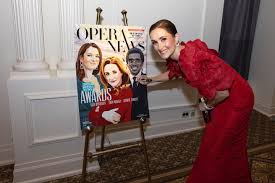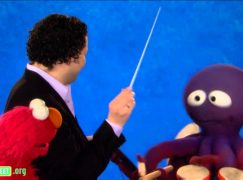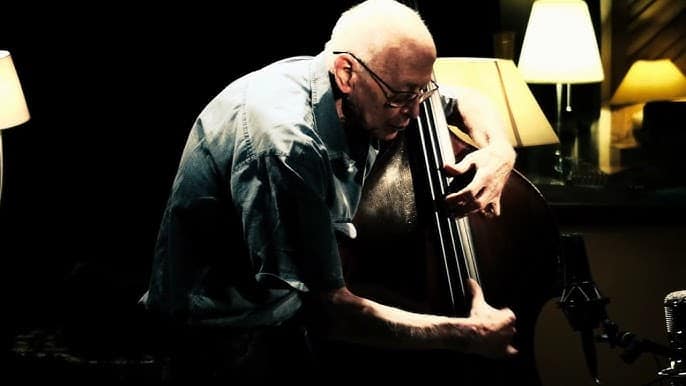Few weep at loss of Opera News
NewsOpera chat-sites have been remarkably dry-eyed at the closure of Opera News, the artform’s only print medium in America.
With a print-run of 32,000, of which only 9,000 were paid subscribers, the magazine’s days were numbered, its impact constricted. Whether it can survive as a baby kanga in the pouch of British-based Opera magazine is an open question. The Met has lost an historic shop-window. Over time it may have cause for regret but the realities are inescapable.
The mourners are freelance writers who received glossy exposure, PRs who have lost a showcase and divas who have nowhere else to turn.
Are there other lessons to learn?
Not many.
America has bee unable to sustain a monthly dedicated to any aspect of classical music – be it recordings, opera or concerts. Strings magazine, which knows its sector and stays close to the bridge, is the lone survivor and always well worth a read.






It is a light weight bit of fluff compared to the more knowledgeable scholarship and comprehensive coverage in Opera magazine. But my favourite publication remains the Italian L’Opera magazine, a monthly labour of love produced by Sabino Lenoci and his team in Milan.
Sign of the times with the increased use of the internet for info, and concerts on demand from your bed, and no need for expensive glossy magazines.
They had an on-line version of opera News with daily updates.
America is dying.
Hard to see anywhere in the world exactly thriving these days
Opera News could never escape the fact that it was aligned with the Met and was basically as a glitzy, in-house fan-zine. Opera isn’t meant to be so smoothed over, so high-gloss.
And yes, a second for Strings. Glad to see it carrying on these tough times for publishing.
It didn’t used to be that way with ON. It became glitz and glitter but through the 1970s-80s it was full of serious articles, essays, and analyses of aspects of individual operas, frequently with printed musical examples. Interviews with artists were much more informative and sans glamor fashion shoots.
Let’s face it, The Metroplitan Opera Guild was destroyed by Peter Gelb. The operation which saved the MET with Mrs. August Belmont and Lucrezia Bori in the 1950’s could not survive the theft of donors, the shop and gallery within the Metropolitan Opera House. When Gelb tried to force them only to write nice things about his trash productions, the handwriting was on the wall. It’s much more than Opera News they did good works for the MET and opera in America. He systematically trampled all over something good. That’s it in a nutshell, the man has been a menace to opera for too long and should go with them.
On target. You must work there…
Exactly right, though “1950s” should read “1930s.”
No, 1950’s when Sir Rudolf Big was GM they nearly folded and if it were not for Mrs. Belmont and Lucrezia Bori and the Guild, they likely would have. There was trouble in the Johnson years, but not to the level of the financial problems of the 1950’s. Perhaps a Google search before you post is in order.
You’re ridiculous. I happen to be related to someone who worked at ON until recently and I know for a fact that the Met administrators did not cross the editorial line. What are your qualifications that allow you to constantly make your absurd comments?
What happened was this: Piqued by a bad review of “Götterdämmerung” in the April issue of Opera News — and further inflamed by a column in the May issue in which the Opera News features editor, Brian Kellow, wrote: “We are in the midst of a very bad period. . . . The public is becoming more dispirited each season by the pretentious and woefully misguided, misdirected productions foisted upon them” — Gelb suggested the magazine stop reviewing Met productions. Nominally at least, Opera News is an editorially independent monthly, but it is published by the Metropolitan Opera Guild, which was set up in 1935 to support the Metropolitan Opera, not slap it around.
Gelb’s inability to ignore the commentary seemed part of a pattern of oversensitivity and highhandedness, given that he previously telephoned the president of WQXR, the classical radio station that broadcasts Met performances on Saturday afternoons, to complain about a blog entry on the station’s Web site, an entry subsequently removed. Under pressure from Gelb, Opera News announced it would no longer review Met productions. An article about the row appeared on the front page of The New York Times. Typical of the many comments on The Times’s Web site: “If Peter Gelb needed the world to know exactly what a colossally stupid, arrogant tyrant he is, [here] it is. His tenure at the Met has been marked by the most lowbrow, boring, musically inept productions the Met has been subjected to in years.”
Almost immediately, the Met, not the Guild or the editorially independent staff of Opera News, announced that Opera News would continue to review Met productions after all. In an interview with The Times, Gelb said he had made a mistake.
Seven months later, when I asked him about the dust-up, he still seemed aggrieved that he had to retract his remarks.
“I had to say I made a mistake, because The Times played it as a censorship story,” he said. “That pushed ‘the button.’ But it wasn’t a censorship story. The Met development staff raises almost all of the money that is raised each year in the name of the guild, $7.8 million last year, which comes in the form of annual gifts ranging from $75 to $1,500. The Met retained $6.5 million and turned over $1.3 million to the guild to help subsidize Opera News. My point was that the guild should stop publishing reviews of the Met altogether, which was not an act of censorship but what seemed to me like common sense under the circumstances. Why should the Met pay for a publication that’s writing negative reviews of Met productions? It’s annoying, like having a pet that bites you.”
His actions, he said again, didn’t constitute censorship because “I wasn’t trying to put Opera News out of business.”
New York Times, Chip Brown, “Epic Ups and Downs of Peter Gelb, March 21, 2013
Among the many articles. Just becaue you are related to someone who worked on the magazine does not mean you know what went on there. I wss there, Gelb told F. Paul Driscoll to give the MET favorable reviews on not publish MET reviews. In the end, Gelb killed the Guild.
Would be interesting to check their subscriber numbers over time. I seem to recall in perhaps the mid-to-late 1980s that they have 60000 readers and mounted a drive to get to 100,000, which they surpassed.
Their “subscribers” included, of course, all levels of Guild membership as well as all levels of Met Opera membership. This represented a built-in subscriber base. As donors dwindled, so did Opera News subscriptions.
I don’t have the same negative feeling about Opera News as many on this site, but the English “Opera” magazine has always been my favorite read.
Then they stopped any kind of advertising or subscription drive after Gelb took over. There was never any mention of ON on the Saturday broadcast or, later, HDs. It was treated as some kind of cosa nostra or affare nostro and I would bet that many potential subscribers did not even know the magazine existed. And the end of any spots for ON on the air definitely stopped with Gelb’s tenure.
Little surprise at the death of yet another print magazine, regardless of focus. Regardless of subject matter, print is dying and advertising no longer depends on traditional media.
I just picked up the Feb 22 issue: 68 pages plus cover, glossily produced, with a mix of fluff (Candace Bergen on opera??) and illuminating content. That real estate includes 4 Met or Guild full-page announcements, 3 full-page ads–for Steinway, a new chamber opera at Lincoln Center Theater (ad space surely at a discounted rate), and the Aix Festival–and two text ads for cultural travel. Notably, tantalizingly, the Aix announcement bears the logos of 16 corporate and government (national and local) sponsors. With their dismal circulation numbers and virtually no advertising, Opera News had become a vanity publication.
It’s heartening to learn that the Met will take over the costs of making dress rehearsals available to school children.
As I wrote in my letter to ‘Opera News’ management when I cancelled my subscription seven years ago, I get more good reading from four annual issues of ‘Opera Canada’ magazine than I do from twelve of ‘Opera News.’
America has two print classical music magazines. They are American Record Guide (started 1935) and Fanfare (started 1977). Both publish every other month.
Fanfare is typically 450 pages per issue and American Record Guide is about 150 pages per issue.
That they do not publish every month appears is not relevant. The fact is America continues to sustain two large, healthy, print magazines, dedicated to the classical music listener.
The loss of Opera News is being felt hard in the American opera community…and, it’s not because of the magazine. It’s because this is yet another example of the loss of arts emphasis which began decades ago. There has been a HUGE expression of emotion shown on various websites and social media outlets. It is a shame that the opera organization which should most promote the Met Guild have done so much to undermine and destroy it.
It’s what it signifies, perhaps, but not what the magazine actually had to offer. Yes, there were some fine writers for it but the tone was too puffy for its subject matter. I’m afraid real opera fans turn to websites (one of which shall remain anonymous here in SD land) and mainstream news outlets.
I’ve only found opera in the past five years, becoming a season ticket holder to the local Minnesota Opera and regularly attending live HD broadcasts (or encores) of the Metropolitan Opera (asw I did today with a 2007 summer encore of “Eugene Onegrin.” Have grown to love the performers and shows. “Opera News” has been a treasured resource through my gifts to the Met and the Met Guild. I’m sorry it has come to this for the magazine (the recent Erin Morley cover issue is a favorite). I will look forward to receiving “Opera” in the future.
This is the first time I am learning about its demise. I looked forward to each issue, especially the diva issue and the reviews of various operas. Why couldn’t they keep it as an on line mag? I am saddened at its demise. As for the British mag, that’s of very little use, due to the cost of European subscriptions. Where will divas and divos get the same attention? I am heartbroken.
Maybe I don’t know numbers/circulation figures, but there remain a surprisingly high number of magazines and publications devoted to classical piano and classical piano playing:
https://www.pianistmagazine.com/
https://www.gramophone.co.uk/international-piano
https://pianoinspires.com/magazine/
All is NOT lost! The American Record Guide is still going strong…… tho’ I have to admit its coverage of live performances is down considerably since the “P” Event. Still, if you want intelligent, thoughtful, INDEPENDENT writing about classical music and opera with NO FLUFF, ARG is your publication. You can still get it in print, and I think they also have a version on their website.
The editor is a bit cranky and opinionated (well, ARG is a “journal of critical opinion”…..), but if what he says bothers you, just don’t read his column.
I think we can put URLs in comments here:
https://www.americanrecordguide.com/
One of the biggest losses is that an advocate for young singers and opera in America has been lost. I always enjoyed learning about singers who either haven’t sung at The Met or choose not to, or important opera productions and premieres outside of NYC.
I had great respect and appreciation for Opera News in the 20th century, especially when they gave favorable reviews to my productions
of the Blitzstein-Lehrman TALES OF MALAMUD. But then in 2001 they blasted SACCO AND VANZETTI (written for the Met on commission!) without having even attended a performance;
printed just 5 of the 15 letters they received, correctly characterizing them as a “STORM OF PROTEST”; but then not once mentioned
me or the opera ever again, reviewing neither its Sep. 10, 2022 orchestral premiere, nor its Oct. 30, 2022 international video launch on Zoom, nor its Dec. 20, 2022 official nomination for the Pulitzer
Prize. So even though they reviewed Jack Beeson’s 2008 autobiography, published by Mellen Press, and I was hoping they would read mine, which Mellen has also just agreed to publish, I guess I can’t shed too many tears regarding their folding up shop. In this I have to agree with Mr. Lebrecht, though I do not appreciate his quoting a disgruntled, mutinous violinist, in his efforts to build himself up and discredit me. Sincerely, Leonard J. Lehrman
I’ll miss Opera News.
Sorry to see the magazine go but frankly, it had begun to go downhill in recent years. The articles were almost exclusively interviews with the singers which is fine, but there is so much more that could be covered. What annoyed me most was the wasted space—-page after page of full length color photos of various singers. This is a music magazine, not a fashion magazine! When Driscoll first became editor one issue was eighty-plus pages but over the years it shrank down to a kind of musical/literary stocking-stuffer. I don’t care for the British magazine Opera either—too much centered on what’s happening in Europe, but it’s the best that we have at present. Very sad and very disappointing!